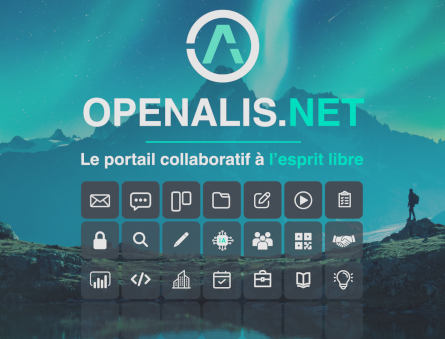Vue lecture
Loc-OS 24
Make GNOME App Grid Scroll Vertically (Like it Used to)
 A new GNOME Shell extension rethinks the app grid (aka the app picker, app drawer, launcher screen – what do you call it?) by making it scroll vertically instead of horizontally. Y’know, the way it used to, pre-GNOME 40. GNOME 40’s switch to horizontal app grid scrolling in 2021 irked a few of the desktop’s mice-favouring aficionados. Their main gripe? Mouse scroll wheel to move horizontally feels off. Not that they need to use their mouse scroll wheel as the app grid has clickable pagers on the sides, works with keyboard arrow keys, and supports swipe touchpad and touchscreen gestures […]
A new GNOME Shell extension rethinks the app grid (aka the app picker, app drawer, launcher screen – what do you call it?) by making it scroll vertically instead of horizontally. Y’know, the way it used to, pre-GNOME 40. GNOME 40’s switch to horizontal app grid scrolling in 2021 irked a few of the desktop’s mice-favouring aficionados. Their main gripe? Mouse scroll wheel to move horizontally feels off. Not that they need to use their mouse scroll wheel as the app grid has clickable pagers on the sides, works with keyboard arrow keys, and supports swipe touchpad and touchscreen gestures […]
You're reading Make GNOME App Grid Scroll Vertically (Like it Used to), a blog post from OMG! Ubuntu. Do not reproduce elsewhere without permission.
CD PROJEKT and GOG co-founder Michał Kiciński acquires GOG from CD PROJEKT
 .
.
Read the full article on GamingOnLinux.
The Performance Of Arch Linux Powered CachyOS On AMD EPYC Servers
NTFSPLUS Linux Driver Renamed To Just "NTFS" With Latest Code Restructuring
Linux's Cache Aware Scheduling On AMD Ryzen 9 9950X3D 3D V-Cache
Updated Linux Drivers Posted For Legion Go & Legion Go S Configuration
Linux 7.0 Expected To Bring IO_uring IOPOLL Polling Improvements
SuperTux 0.7 Reaches Beta For Reviving An Open-Source Classic
Green 22.3.0
StormOS January Point 1
KDE Plasma's Wayland Transition "Nears Completion" In Ending Out 2025
Ancestris en v13 stable
Pour mémoire, Ancestris est un logiciel de généalogie. Il est développé en Java et disponible sous licence GPLv3

C'est officiel depuis le 30 novembre 2025 :
- La version stable est Ancestris v13 ;
- La version journalière est nommée Ancestris v14.
La v13 en quelques chiffres :
- Plus de 1200 commits ;
- 18 mois de développement ;
- Fonctionne sur tous les systèmes d'exploitation qui permettent d'installer Java de la version 17 à la version 25.
- lien nᵒ 1 : Ancestris
Nouveautés :
- Refonte de l'ensemble des rapports ;
- Unification et amélioration des options de rapports ;
- Ajout de look and feel sombres ;
- Refonte du module de relevé ;
- Ajout d'une fonction de transcription d'acte basée sur l'IA Mistral ;
- Fonction pour modifier tous les noms en majuscules ;
- Refonte du module de fusion de doublons ;
- Ajout d'un bloc-note de recherche ;
- Ajout de la possibilité d'appeler les rapports par un bouton dans la barre de menu ;
- Ajout d'un rapport de chronologie verticale ;
- Ajout d'un rapport circulaire descendant ;
- Ajout d'un rapport de professions au cours du temps ;
- Ajout d'un rapport d'arbre en étoile ;
- Ajout d'un générateur d'étiquettes ;
- Ajout d'un visualiseur de rapport SVG.
Évolutions et corrections :
- Améliorations de Cygnus ;
- Améliorations d'Ariès ;
- Amélioration de l'éditeur GEDCOM ;
- GedArt ajouts de fonctions pour exporter plus de données ;
- Améliorations du modules de groupes familiaux ;
- Corrections de la table des entités ;
- Améliorations du module de vérification des anomalies ;
- Améliorations du livre web ;
- Amélioration du module de site web ;
- Améliorations du module d'ancêtres communs ;
- Améliorations du module de suppressions de tags ;
- Améliorations de l'export Geneanet ;
- Améliorations du module graphe ;
- Améliorations de l'arbre graphique ;
- Améliorations de l'import Geneatique ;
- Améliorations de l'import Aldfaer.
Mise à jour des traductions :
- Allemand ;
- Anglais ;
- Catalan ;
- Danois ;
- Espagnol ;
- Français ;
- Hongrois ;
- Néerlandais ;
- Polonais ;
- Portugais ;
- Russe ;
- Tchèque ;
- Turc.
Merci à tous les traducteurs pour leur travail constant, si important pour l'ensemble de la communauté.
Pour conclure, merci à toute la communauté par vos remarques, vos demandes, vos remontées d'anomalies, vous permettez de faire vivre et embellir ce logiciel.
On compte sur vous dans la suite pour nous créer du buzz, des tutoriels, des idées et de l'enthousiasme.
Commentaires : voir le flux Atom ouvrir dans le navigateur
Linux 6.19-rc3 Released With A Holiday's Week Of Fixes
D7VK 1.1 Released With An Experimental Direct3D 6 Frontend
OPENALIS.NET un projet ambitieux pour apporter des alternatives dans le paysage numérique FR
Et si nous développions un portail collaboratif communautaire ?
OPENALIS.NET est un projet 100% open source en recherche d'un coup de boost pour arriver sur le marché FR très prochainement.
Un premier tour de table sera mené à partir de la fin du premier trimestre 2026 en fonction des retours de potentiels investisseurs afin de créer une nouvelle structure proposant LE portail collaboratif libre FR à la fois pour les particuliers et les entreprises.
(NdM.: LE ça semble ambitieux pour un nouveau projet avec Cozy/Twake, Nextcloud, Yunohost, etc. en libre sur des secteurs similaires)
Un accès simple pour tout le monde et une plateforme crédible pour les entreprises.
(Le nom du projet est voué à changer par la suite.)

- lien nᵒ 1 : Projet OPENALIS.NET
- lien nᵒ 2 : Campagne de financement
- lien nᵒ 3 : Entreprise qui porte le projet
- lien nᵒ 4 : Vidéo projet
Au programme :
- plus de 50 applications open source pour couvrir tous nos besoins numériques
- un accès simple (login + mdp) s'adressant à toutes et tous
- des offres pour particuliers et entreprises
- un premier niveau gratuit avec l'essentiel (email, chat, partage de fichiers…)
- des garanties fortes pour les entreprises (ISO 27001, SecNumCloud…)
- une équipe FR dédiée à la maintenance et l'évolution de la plate-forme
Une campagne participative est lancée sur Ulule : https://fr.ulule.com/openalis-net/
Les informations du projet sont disponibles sur : https://openalis.net
Lors du dernier salon de l'OSXP sur Paris, OPENALIS.NET a reçu un accueil très chaleureux.
Avec plusieurs centaines de participants à cette campagne nous pourrions changer définitivement la donne en termes d'alternative souveraine sur notre sol et partout ailleurs.
Commentaires : voir le flux Atom ouvrir dans le navigateur